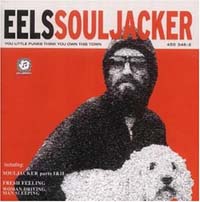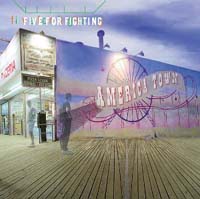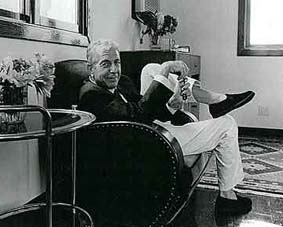|
In Cameron Crowe’s
film Singles, Matt Dillon’s character Cliff
Poncier tells a journalist (played by Crowe himself) that
despite their apparent lack of success, his band, Citizen
Dick, is huge in Belgium. The comment on one hand humorously
illustrates the desperation of a man trying to claim some
validity despite a lack of success in his home city of
Seattle. On the other, it is an attempt to prey on the
mysterious mythology of gaining a following in the foreign
land of Europe, where somehow, these more highly-cultivated
lovers of art recognize genius where we cannot.
It is both a marketing
tool and a paean to art. Music labels release different
versions of the same albums, with additional bonus tracks
for European audiences. This can only benefit the labels
and the bands, because such releases capitalize on the
adoration of American pop culture while simultaneously
allowing these overseas audiences to be rewarded something
superior than their American counterparts—who, if
they care enough for the band, will still go out and spend
extra cash for it as well. Everybody wins, except for
the poor schmoes who shell out their hard-earned cash
for the Dutch import of some album because it has an extra
live track hidden at the end. And quality is not an issue,
of course; the same is true for a release from Bob Dylan
or Beck as it is with some new flavor of the month, giving
a nice fabric softener to their emperor’s new clothes.
 |
|
The
Olympia Theater in France in 1976
|
This extends beyond music.
What has mass appeal in Europe often has only a select
audience at home. Forget the tired cliché of Jerry
Lewis fans in France—I’ve never seen or heard
of them, not a one; the seriously adored honorary American
darlings of Western Europe are those such as filmmakers
Woody Allen, Jim Jarmusch, Todd Solondz, singer Leonard
Cohen, and author Paul Auster, to name a few. And the
Coen brothers, until their recent domestic success began
to even the score. Jazz music itself is far more widely
appreciated in Europe than it is in the mainstream of
the U.S. One suspects there is a certain smugness to it
all; not only are they appreciated for their works, but
the very act of Europeans proclaiming these North Americans
as formidable talents—those who are not nearly as
appreciated in their own land—is a relished statement
of cultural superiority. As in, "how can you all be so
dense so as to not see wonderful art right under your
nose? You know nothing." Maybe most of us don’t.
After all, when we walk into national video chains, we
are greeted with 30 copies of the newest big releases,
guaranteed to be there, and one copy, if we are lucky,
of Woody Allen’s films.
The Internet, that unruly
friend/foe of pop commerce has opened borders as expected.
It has torn down some of the pretentious PR walls that
exist, dispelling some of that mystique. Fans of bands
can read the set lists each day of a European tour and
can easily download what were previously (and therefore
expensive) non-U.S. releases from either bands’ own
sites or file sharing programs. Just over a year ago,
I paid $30 for a Japanese import of jazz/blues musician
Terry Callier’s most recent album, not available
in the U.S. at the time. Ironically, it was recorded in
Chicago, where I was living at the time, yet I had to
order all the way from Japan to get it. And when it arrived,
it had the Japanese overlay, giving this, an album of
nothing but Americana, the aura of Asia, and I was more
than a little seduced by it as something of greater artistic
value.
Film and literature is
translated or dubbed and more accessible to foreign audiences
than music, making a relationship between musician and
foreign audience unique. Perhaps the most prime example
of this is Leonard Cohen; the opening page of his official
website, leonardcohen.com has links to microsites for
fans in Belgium, France, Holland, Italy and Poland. His
albums, like the films of Woody Allen, have greater success
in Europe than they do on his own continent. And Paul
Auster—who lived in France years ago and speaks French—writes
in English, then is translated by others. Imagine that,
a master of words being more appreciated in a nation where
they aren’t even his words being used. Ironic? Who
cares. Those who know him and his work in the United States
only see the Euro-adoration as a boon to Auster’s
street cred. And if it makes us American readers a little
more cosmopolitan in the process, all the better.
 |
Another issue at work here
is the concept of the release date, and how it is selected
for different countries based on reputation and appreciation
or for entirely different reasons. The Eels found more
success in Europe, with greater albums sales than in the
United States. Souljacker, the latest Eels album,
was released in Europe almost 6 months ago and still won’t
be released in the U.S. until next week. Why is that?
It is a bit of a sonically difficult album and except
for a few tracks it is less radio-friendly than the last,
Daisies of the Galaxy. Is an initial European release
a way to have it embraced where the record company is
more certain of its success, which could in turn prompt
a larger reception back home? The "Big In Europe" strategy?
Or could it have anything to do with its sardonic, flippant
tone? This is pure conjecture, but it might be related
to the title track itself, which includes the lyrics:
Johnny don't like the
teacher
Johnny don't like the school
One day Johnny is gonna do somethin'
Show 'em he's nobody's fool
Oh yeah
This may seem inconsequential
as controversial lyrics go, but Sept.11th aside,
jokes about school shootings are not taken lightly in
the States. And this wouldn’t be the first time for
something like this: the film O, last year’s
modern version of Othello, was completed in 1998 but its
release delayed due to the rash of high school violence
like that depicted in the film. As for the Eels, the band’s
website offers no explanation for the delay except an
acknowledgment of the injustice of the wait, and an apology
of sorts by making it a double album with some rarities
and (European) B-sides that is adding to the price of
the album. Regardless of the reason for the delay, the
point remains that the Eels like other bands, have a specific
relationship with European fans that differs from those
in North America. And now the band is giving something
back to its American fans that normally goes to those
in Europe.
***
As for cinema, the Internet
has erased the notion of targeted, slow release. Word
of mouth travels instantly now. A kid online in Europe
or Malaysia can watch trailers for all the latest films
being released in the US months and months before the
specifically timed ad campaign begins in his country.
Without even intending to, the Internet allows for global
advertising campaigns. And the studios have caught onto
this. Who are they to stand in the way of that and not
capitalize on universal interest in a film? Five years
ago, most American films being released in France had
come out in the States on average almost half a year earlier.
Now it is three months, even less. Harry Potter,
Lord of the Rings and the upcoming Time Machine
as well as Star Wars Episode II have initial
release dates within days of the American premieres. But
what of American films released far in advance overseas?
Sure, some of this had to do with funding agreements,
particularly if some of the production money comes from
European countries, for example. The
films Donnie Darko, Storytelling and the
upcoming Human Nature have been playing in France
for months. All three have highly bankable American movie
stars in them, but share the trait of having complicated,
genre-bending plots. Storytelling, Todd Solondz’s
first film since 1998’s Happiness, has a fairly
graphic sex scene that features red boxes covering the
naked bodies of the couple—a pre-emptive protest
again the MPAA’s inevitable verdict of an NC-17 rating,
commercial suicide (and possibly forbidden according to
Solondz’s contract which might—as other filmmaker’s
do—stipulate that he can do anything as long as the
film gets at most an R rating). All the commentary about
these red boxes point out how the film’s European
version does not have any kind of censoring, just as Kubrick’s
Eyes Wide Shut before it. Again, the idea of European
audience maturity, contrasted to the reputation of U.S.
repression. And it is without a doubt that U.S. fans of
this or other films will patiently wait for the DVD, in
hopes of seeing the "real" movie, giving rise to the idea
of European versions as the true and pure form of American
works.
 |
In addition to the culture
gap between nations, is a prioritizing of the dialogue
between fans, press and musicians in Europe. John Ondrasik,
the singer/songwriter of the popular band Five For Fighting
sees a largely different perspective overseas. "The most
pleasing thing to me has been the sophistication of the
international press," says Ondrasik, whose album America
Town has sold more than half a million units and is
just starting to gain notice overseas. "I love the fact
that [with European journalists] we spend 90 percent of
the time talking about the themes of my record beyond
just the musical component. Sadly, in the States this
is a scary commodity.
"Obviously, marketing a
record called America Town is a bit challenging
internationally though at the end of the day it's still
about the songs… and frankly the themes of [the album]
are surely not unique to America." For Ondrasik’s
first album he teasingly recorded a hidden track called
European B-Side, a coda of sorts that brings together
the themes of the album.
The question arises, though,
about whose expectations are being catered to by press
and industry. Is "substance" really a commodity in the
United States? Has Jefferson’s "marketplace of ideas"
really boiled down to the lowest common denominator? Or
is that just a bunch of hooey, the common complaint of
American disinterest in art beyond the black and white?
Lately, these questions have spilled over into the arena
of politics as well. Not a few European leaders have criticized
President Bush for his Reagan-esque oversimplification
of conflict and world affairs with his self-ascribed "Texas-style"
lingo, and his clearly defined notions of Good vs. Evil—with
respect to the war on terrorism but also beyond that.
This is an embarrassing legacy of Americans as not even
so much narrow-minded or puritanical, but as unable or
unwilling to explore and accept the complexities of both
history and current events. An obvious exercise in generalizations
to be sure, but it all feeds our mutual notions of what
is worth our time and theirs.
And yet, couldn’t
some of this culture appreciation be this same over-simplication
in the other direction? The mystique of New York City
is vital to the works of Woody Allen and Paul Auster in
a way that works as a travelogue of sorts. Nashville-based
non-country musician Josh Rouse admitted that many European
journalists would ask him the same questions about Garth
Brooks and country music over and over because he was
from the same region in the U.S. And there is no doubt
that Things American have a high value of currency overseas,
if at the present time, these sweet thoughts are limited
to our pop culture.
***
Still, Auster,
Cohen, and the late Jeff Buckley… ultimately these
are artists that show respect—props, if you will—to
other countries. Foreign audiences reward them with their
attention and support for what they see as larger
world views, beyond the "americentricism" of other pop
culture figures. Contrary to belief, the French don't
hate people that don't speak their language. They would
just respect you a whole lot more if you at least spoke one
more, any other, in addition to your mother tongue.
 |
|
Leonard
Cohen
|
Depending on
the audience, being Big In Europe is definitely a boon,
revealing a higher sense of cultivation, a special status,
something to aspire to. Or alternatively, it is commercial
suicide, the equivalent of being a communist: Obscure,
contrarian radically difficult. But at least there aren’t
any subtitles. Sure, Europeans love themselves some Hollywood-grown
no-brainers, but we all have guilty pleasures. That isn’t
the official m.o. of cinema or music over here. Once,
years ago one of the "Why Ask Why? Try Bud Dry"
ads asked why foreign films have to be so foreign.
The images were a parody of Bergman and Fellini. True,
these auteurs were Europeans themselves, but the sentiment
remains whoever is behind it. Over here they like all
that kind of "weird, boring, challenging stuff."
But if we Americans can get their respect, so it goes,
we must be doing something right.
|